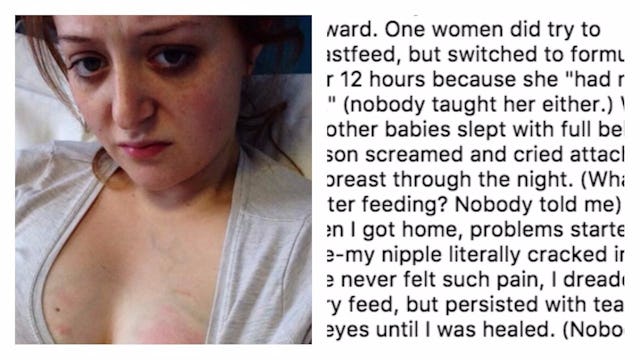‘This Is Mastitis’: Mom Shares Story Of Dealing With The Condition

Mom shares photo of infected breast to help educate others about the challenges of nursing
Any mom who’s tried breastfeeding knows it can be tough, especially at first. Sadly, the difficulties of nursing aren’t always discussed as much as the constant message that “breast is best.” The knowledge that it can be challenging often comes after the fact.
One mom decided to share her breastfeeding struggles in hopes of letting new mothers know what nursing can really look like.
Remi Peers made it to a year of breastfeeding her son before taking to Instagram to detail her experience with mastitis and a rough start with nursing. She points out that so many of the issues moms encounter aren’t talked about openly leaving women to feel that they’re abnormal for experiencing them. She seeks to change that by getting very real about the hurdles she overcame as a nursing mom.
“This is mastitis,” she writes, alongside a photo of herself while suffering from the infection. She shares that breastfeeding was never easy for her. And she didn’t see the difficulties coming.
“My milk came in after 5 days. I wasn’t aware that it could take that long, I didn’t even necessarily know what “milk coming in” meant. (Nobody ever taught me.)”
Peers was the only mom in her hospital ward attempting to nurse. “One woman did try to breastfeed, but switched to formula after 12 hours because she “had no milk” (nobody taught her either.) While the other babies slept with full bellies, my son screamed and cried attached to my breast through the night. (What was cluster feeding? Nobody told me.)”
The troubles didn’t end after she went home. Peers had a cracked nipple and nursing became incredibly painful.
“Nobody taught me that breastfeeding could be painful, nobody taught me what a good latch looked like.”
Nervous to nurse her son in public, she would either pump at home or wait to find a bathroom to feed him. She says this likely contributed to her mastitis infection. “This resulted in clogged ducts and engorgement. (I feed freely in public now, and have done for a long time. Fuck this backwards society!)”
“Then came mastitis.”
Peers says she woke one night with typical symptoms of the infection — shivering, shaking, chills and a fever. By morning, she was vomiting and during the night, had developed sepsis. She says, “This was because I was not able to recognise the more subtle signs of mastitis (as I had seen no redness that day).”
The mom was rushed to the hospital and given morphine and antibiotics, separated from her son for two nights.
Peers explains there’s even more to the story, but her main point is demonstrating the fact that there’s a “lack of support and education surrounding breastfeeding.” She writes, “I don’t mean in terms of relaying the benefits of breastmilk and handing out lactation support leaflets. I mean general education, about the basics of breastfeeding, about cluster feeding, about the problems that can arise and what to do, how to spot them and how to remedy them.”
Peers points out that women aren’t expected to give birth without help, but that breastfeeding doesn’t come with that same kind of support and education. We’re told by doctors and nurses to breastfeed, but aren’t given enough detail about what’s normal and what isn’t — leading some moms to give up when they’ve hardly even started. “Breastfeeding is HARD, it needs to be taught and it needs to be learned. Just like walking, talking, reading and writing- it may be natural, but it does not always come naturally,” she says.
Education and support are truly the keys to getting moms on the right track with breastfeeding, but those who have been there speaking out about their struggles is just as important.
“If new mothers knew just how difficult it can be at first, more would take themselves to prenatal breastfeeding classes, buy books, join forums, and ask more questions- But we don’t, we just assume that it will feel as natural as breathing. Because no one ever told us.”
Kudos to Peers for sharing her story and hopefully, helping other moms know they’re not alone.
This article was originally published on